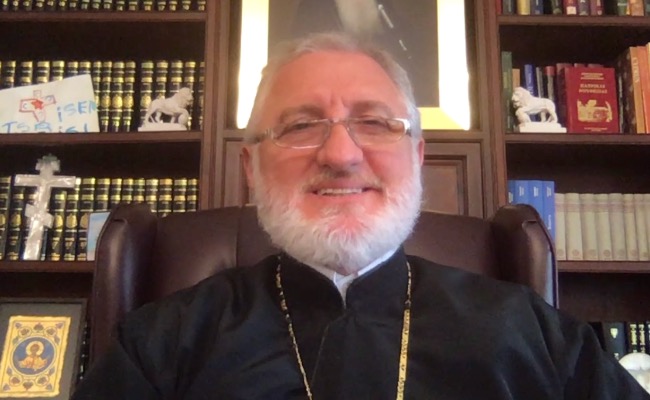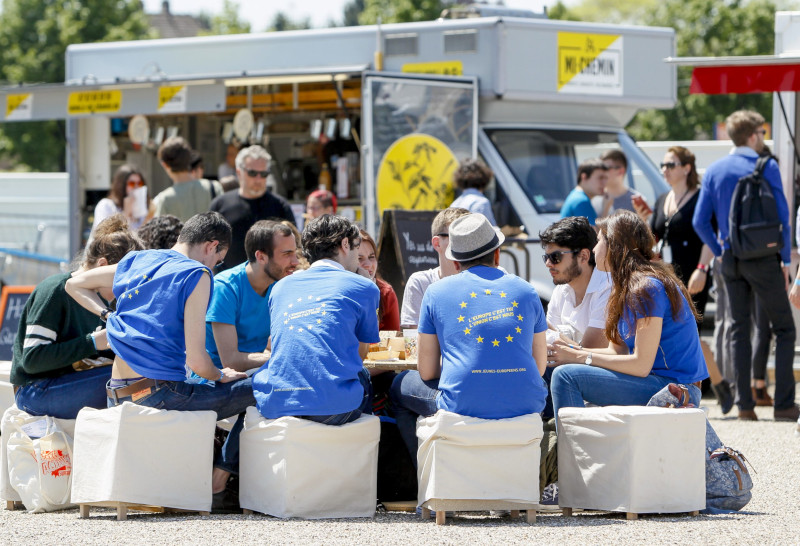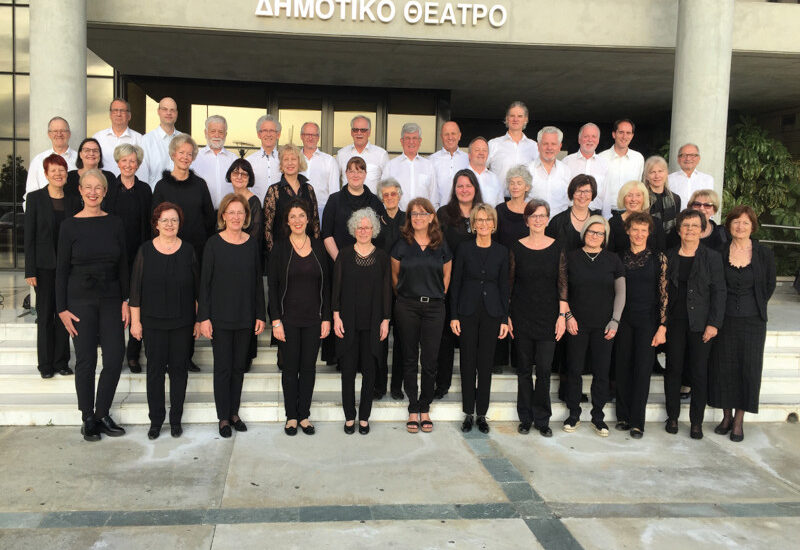“Foundations of Servant Leadership”
His Eminence Archbishop Elpidophoros of America Address at the 4th Annual National Advanced Orthodox Leadership Conference “Foundations of Servant Leadership”
Archbishop Elpidophoros
“I greet all of you with a salutation of peace at the beginning of this new Church year which, as you all know, also coincides with the day of prayer for the protection of the environment on September 1st. I mention this because I believe there can be no leadership without stewardship. What do I mean by that? You cannot lead effectively if your own house is not in order. Scriptural tradition teaches us that Ὁ οἰκονόμος refers to the state of “son-ship” and “servant-hood” more than the simple act of ownership or control. This meaning is particularly significant in St. Peter’s First Letter when he writes: “As each has received a gift, employ it for one another, as good stewards (ὡς καλοὶ οἰκονόμοι) of God’s varied grace.” (1 Peter 4:10) This human vocation, this mission, also applies to God’s creation, as His All-Holiness Ecumenical Patriarch Bartholomew has tirelessly repeated: “we are called to be stewards, and reflections of God’s love by example. Therefore, we proclaim the sanctity of all life, the entire creation being God’s and reflecting His continuing will that life abound.”[1]
This stewardship of service for, and in the life of the Church is essential, beyond even the protection of the natural environment, in order for anyone to grow into servant leadership. Today’s conference is focused on the concept of “servant leadership,” which echoes Christ’s teaching in the Holy Gospel according to Matthew: “the Son of Man came not to be served, but to serve, and to give his life as a ransom for many.” (Matthew 20:28)
This connects to the first theme the organizers of the conference have asked us to reflect on, our personal preparation or training for a position of leadership. I would say that in my own case, this training happened by relationship. As you know, our Orthodox spirituality is shaped by our relationship to images, either living images, people, or by images that are objects, like icons.
I have to admit that I was inspired by both: the icons of the saints as accomplishments of our Christian vocations, and the inspiration one can find in the proximity of a true spiritual leader or father. You observe and you emulate their virtues and skills. This learning process is deeply linked to our spiritual life, but also, in my case, to my own monastic vocation and experience, especially at the Ecumenical Patriarchate and through the person of His All-Holiness Ecumenical Patriarch Bartholomew.
As I said, leadership is a learning process, and the desire to learn more is good preparation for successful leadership. Learning and leading are both meant to build bridges, to connect people and to create relationships as we move forward with our projects and missions. I am sure that you are all familiar with the beautiful image of the world as a circle developed by Saint Dorotheos of Gaza:
“Imagine that the world is a circle, that God is the center, and that the radii are the different ways human beings live. When those who wish to come closer to God walk towards the center of the circle, they come closer to one another at the same time as to God. The closer they come to God, the closer they come to one another. And the closer they come to one another, the closer they come to God.” (Instructions VI)
Here is our mission as Orthodox leaders: to support people’s journeys toward God and to facilitate their communion with one another.
Allow me now to tackle the second question regarding supporting healthy change and addressing resistance to change. As you know, I have been in this country for almost a year and a half, and together with the clergy and lay leadership of our entire Archdiocese, we have worked to improve the vision and mission of our ministries. These changes will be successful only if we are able to create consensus among the leadership of our community.
However, we, Orthodox, are often allergic to any kind of change; of course, not because it isn’t useful, but because any change is seen as going against tradition. I also think we should pay particular attention to the language we use. Language is leadership. We use it to inspire, to bring people together, to pass on a message and to share a vision. In essence, we offer a narrative that creates community. This ministry of the word is not limited specifically to the confines of the Church, where the revelation of the New Testament is shared; rather, it also inspires and shapes our entire ability to offer the mystery of salvation to the world.
The third point mentioned among the questions given to us is about inclusivity. Let me start by reflecting very quickly on the terminology. What do we mean by inclusivity? Is it to include those who might otherwise be excluded or marginalized? To me, the issue of inclusivity profoundly echoes the catholic nature of the Church, her universal quality that “recapitulates”, from ἀνακεφαλαίωσης, in the sense of Saint Irenaeus of Lyon, all the diversity of humanity.
Having said that, the questions we face are more practical. The Orthodox Church has been dealing with this tension of unity in diversity since her inception at the time of Pentecost. How should we listen to the call of the Holy Spirit represented by this diversity? Inclusivity means giving a voice to those who are usually silent, listening to them and creating a culture of real dialogue, with dedicated spaces.
These spaces exist, and we call them ministries. We should rejoice, for example, that more and more leadership positions in our Orthodox Church are now filled by women. Having visited so many parishes in the Greek Orthodox Archdiocese, I can affirm the presence of many talented women as Parish Council Presidents. At the same time, though, let us be realistic. There are many aspects of the Church’s leadership that can be improved, and I am very grateful to the organizers of this conference for leading our thoughts and helping us increase our awareness of our current situation.
As I mentioned earlier, there is no good leadership without continuous education. But that means we must be ready to be taught and to admit that we do not have all the answers to all the questions. Here, I would like to give a pointed example from the current pandemic. Who knew what COVID-19 was back in January? In the midst of this incredibly challenging time for our clergy and laity, but also for us as bishops, we had to seek advice from medical professionals, epidemiologists, lawyers, etc., so we could make informed decisions about parish and diocesan life.
The most challenging decision we faced concerned the distribution of Holy Communion. The Holy Eucharist is really and truly the Holy Body and Blood of our Lord Jesus Christ. And, as such, Holy Communion does not transmit any virus or disease. But the way Communion is offered to the faithful, together with the vessel we use — a metallic spoon — still remains of this world. The spoon could potentially transmit the virus. We have to distinguish these two things: the Holy Eucharist and the way it is distributed. I have listened to the scientists, since science and faith are not contradictory. In fact, they exist in parallel, and thus, they are never in conflict. The way we give Communion today is not a doctrine, it can evolve, as it already did in the past. Therefore, the safety of our faithful is a great concern to all of us.
And now, let us face the cruel reality of the future of our communities in a time of pandemic and financial hardship. I don’t know if the projections made by experts — that 25% of all parishes will close due this hardship — is true. On the ground, I know that our communities are struggling. Incomes are at a record low. Hall rentals, schools, and festivals are not going to resume soon. This crisis shows the weakness of our model. Perhaps, is it time to reevaluate some of our certainties. This is why — following the creation of a relief fund for COVID-19 victims — we have decided to create a similar system for parishes, providing not only financial support, but also more technical expertise to support their financial sustainability. This is why I also welcome the newly developed pan-Orthodox Intensive Program in Servant Leadership for parishes.
Dear Friends,
All these leadership skills are nothing if they are not supported by prayer. We will always carry hardships with us, but the way we respond to them is always unique and bears great consequences for the life of the Church. Any decision-making process should be supported by prayer and the acquisition of virtues. Our vocation to become Christ-like is a call for service with love and sacrifice.
I look forward to the conversation with my brother hierarchs during our upcoming panel, and am also very grateful to the Orthodox Christian Leadership Initiative for this opportunity to reflect on these difficult questions.
Thank you and see you soon!”
[1] Address of Ecumenical Patriarch Bartholomew at the Environmental Symposium, Saint Barbara Greek Orthodox Church, Santa Barbara, California, November 8, 1997



